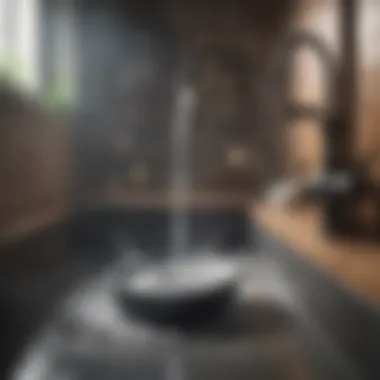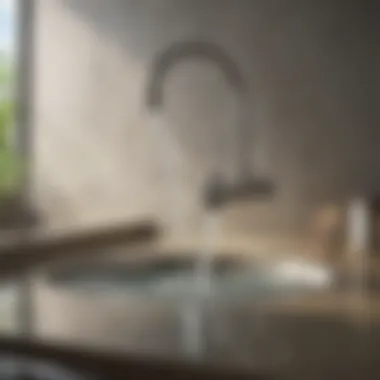Does Boiling Water Effectively Unclog Drains?


Intro
Clogged drains are a common nuisance in households. They can disrupt daily activities and lead to unpleasant odors or even more significant plumbing issues. One popular method often suggested is using boiling water to resolve these blockages. However, the effectiveness of this method is not universally agreed upon. This article delves into the science behind using boiling water as a potential remedy for clogs, identifying when it might be useful, and exploring more effective alternatives and preventive measures.
Understanding Clogged Drains
Clogs can occur due to a variety of reasons. Common contributors include:
- Grease buildup: Fatty substances can accumulate over time, creating obstructions.
- Hair: Trapped hair commonly causes bathroom sink and shower clogs.
- Soap residue: Soap can harden and combine with other substances, leading to blockages.
- Foreign objects: Items like toys or other debris can fall into drains and create serious clogs.
Before determining whether boiling water can be a solution, it is crucial to understand the type of clog and its composition.
The Science Behind Boiling Water
Boiling water works primarily through the principle of heat transfer. When liquid is heated, its temperature increases, which in turn can potentially dissolve or soften some materials causing the clog. Here’s how it might help:
- Dissolves grease: Heat can help to break down greasy residues, making them easier to wash away.
- Flushes debris: The force from boiling water can push smaller particles through the pipe,
- Safe for some materials: Boiling water is generally safe for pipes made of metal or certain plastics, although it could pose risks for older pipes or those made of PVC.
Important: Always ensure the type of pipe is suitable for hot water exposure before applying this method.
Situations Where Boiling Water May Help
There are particular circumstances where using boiling water could be beneficial:
- Minor, recent clogs: If the clog has just formed, hot water may help dissolve it.
- Clogs caused by grease: In kitchens, heavy grease buildup might respond well to boiling water.
However, boiling water may not be effective against:
- Solid blocks: Items like toys or large pieces of debris.
- Hair clogs: These require mechanical methods for removal, such as a drain snake.
Limitations of Using Boiling Water
While boiling water can sometimes assist with minor clogs, there are limitations:
- Risk of pipe damage: Too much heat can damage older or weaker pipes, leading to potentially serious issues.
- Temporary solution: Any effects are usually temporary. Without addressing the underlying cause, clogs will reform.
- Not suitable for all materials: Some plumbing materials may react adversely to high temperatures.
Alternative Methods for Unclogging Drains
If boiling water doesn't resolve the issue, consider these alternative methods:
- Plunger: A simple and effective tool for creating suction and dislodging clogs.
- Drain snake: A practical tool for reaching deeper clogs caused by hair or foreign objects.
- Chemical drain cleaners: These can be effective but should be used sparingly. Always follow safety instructions and avoid mixing different brands.
- Baking soda and vinegar: This natural method can break down minor clogs. Pour half a cup of each into the drain, let it sit, then flush with hot water.
Preventive Measures for Drain Maintenance
To maintain clear drains and prevent clogs, consider the following strategies:
- Regular cleaning: Schedule routine drain cleaning and maintenance to catch issues early.
- Use drain screens: These can trap debris and prevent it from entering the plumbing system.
- Be mindful of what goes down the drain: Avoid putting grease, coffee grounds, and large food particles down kitchen sinks.
By understanding the science behind boiling water, its limitations, and alternative methods, homeowners can take a more informed approach to drain maintenance. The maintenance of a household's plumbing system is crucial for enhancing functionality and preventing future complications.
Preamble to Drain Issues
Understanding drain issues is essential for any homeowner. Clogged drains are not only a nuisance, but they can escalate into more serious plumbing problems. Recognizing the signs of a clogged drain early can save time and money in repairs. This article examines various methods for addressing clogs, highlighting the common strategy of using boiling water and its effectiveness in unclogging drains.
Understanding Clogged Drains


Clogged drains occur when debris accumulates in pipes, hindering the flow of water. It is important to understand how this happens to take preventive measures. Common areas where clogs occur include sinks, showers, and toilets. Problems in these areas are usually linked to a buildup of hair, soap scum, food particles, or grease. Over time, these materials form blockages which can lead to slow draining or complete stoppage.
Homeowners often notice the first signs of trouble through slow-draining fixtures or water backing up. When ignored, these small annoyances can develop into full-scale flooding or pipe damage, resulting in expensive repairs.
Common Causes of Clogs
The causes of drain clogs can be quite varied. Here are some frequent contributors:
- Hair: A substantial number of clogs occur in bathroom sinks or showers due to hair. When hair combines with soap and other materials, it forms a dense mass that obstructs pipes.
- Soap Residue: Many soaps produce a residue that builds up over time. This residue can cling to existing debris, worsening the blockage.
- Food Waste: Kitchens often face clogs caused by food particles. Even with a garbage disposal, small bits may escape and gather within the pipes.
- Grease: Cooking oils and fats are significant culprits in kitchen clogs. When poured down the sink, grease cools, solidifies, and clings to the pipe walls.
- Foreign Objects: Items accidentally dropped into drains can easily cause blockages. This could be anything from children’s toys to dental floss.
Awareness of these factors can help prevent clogs from forming in the first place, which is crucial for maintaining plumbing health.
The Role of Boiling Water in Unclogging
Understanding the role of boiling water in unclogging drains is pivotal for effective home maintenance. This method is often discussed in the context of plumbing, yet its true efficacy varies based on specific conditions. Many homeowners look for quick solutions, and boiling water appears to be an appealing option at first glance. However, its effectiveness depends on various factors, including the type of clog and the material of the pipes. By exploring the mechanisms by which boiling water can aid in drain clearing, readers can make informed decisions about this method.
How Boiling Water Works
Boiling water works primarily through heat and pressure. When poured into a clogged drain, this hot water can break down debris. The high temperature can help liquefy grease and dissolve soap scum, two common culprits in clogged drains. As the water flows down the pipes, it creates pressure that can help dislodge smaller blockages.
In particular, when grease and other organic matter accumulate, boiling water can alter their composition. For example, fats can solidify at room temperature, leading to blockages. By raising the temperature, boiling water helps to melt these fats, which then disperse and flow away. Despite its simplicity, this method may not suit all situations, and understanding its limits is necessary for effective application.
Types of Clogs That Benefit
Not all clogs are the same, and boiling water is most effective against specific types. Here are some types of clogs that can benefit:
- Grease Clogs: Grease buildup from cooking can cause drains to slow down. Boiling water can help melt and wash away this type of blockage.
- Soap Scum: Soap residues can accumulate in drains, particularly in bathrooms. The heat can help dissolve these deposits, improving flow.
- Hair Clogs: While boiling water may not fully clear hair from drains, it can help loosen hair wrapped around other debris, facilitating easier removal.
It is essential to note that boiling water is less effective against solid blockages, such as tree roots or foreign objects. For such instances, other methods may be necessary. Overall, understanding how boiling water works and which clogs it can benefit can improve drain maintenance strategies.
Scientific Principles at Play
The use of boiling water to address clogged drains is not just a simple household tip; it is firmly rooted in scientific principles. Understanding these principles provides insights into how effective this method can truly be. The effectiveness of boiling water relies on two key areas: temperature-related effects on materials and the chemical dynamics at play with the debris that causes the clog. This section will elucidate these important concepts, enabling readers to grasp how boiling water serves as a potential remedy for drain clogs.
Temperature and Material Considerations
When dealing with clogs, the temperature of the applied solution is crucial. Hot water can alter the physical properties of substances blocking the drain. For instance, many common clogging materials, such as grease or soap scum, possess thermal dependencies. Their solid state tends to become more malleable or even liquid at higher temperatures. When boiling water is introduced into a drain, it can effectively soften or dissolve these materials, which facilitates their movement through the pipes.
However, different materials react variably to heat.
- Plastics, for instance, may deform if exposed to excessive heat.
- Metal pipes generally tolerate higher temperatures, but repeated exposure could lead to long-term integrity issues.
- Older plumbing systems, often made from materials like iron or lead, can be adversely affected if subjected to frequent boiling water treatments. Therefore, knowing the composition of your pipes is essential before using hot water as a remedy.
Proper consideration of the specific material in your plumbing system will dictate the wisdom of utilizing boiling water as a solution. Care must be taken, as overheating can do more harm than good in certain situations.
Chemical Reactions with Debris
In addition to thermal effects, chemical reactions play a vital role in unclogging drains. Boiling water can accelerate the dissolution of certain compounds commonly present in clogs. For example, when hot water interacts with soap residues, it may chemically break down the bonds held within the material, leading to easier removal.
Some specific chemical interactions include:
- The emulsifying action of heated water on greasy deposits, which makes them easier to wash away.
- The potential for precipitation reactions to occur if certain chemicals in the drain solution combine with contents of the clog, leading to byproducts that may be more easily removed.
However, caution is advised. Mixing different drains cleaners with boiling water can sometimes create unwanted reactions that may produce toxic gases or other harmful byproducts. Thus, it is always prudent to fully understand the materials involved to prevent adverse effects when trying to clear a clogged drain with boiling water.
"Understanding the scientific principles behind using boiling water on clogs can enhance your approach to plumbing maintenance and ensure safer, more effective methods."


In summary, both temperature and chemical reactions are critical factors in the effectiveness of boiling water on clogs. Recognizing these principles equips homeowners with valuable knowledge to either endorse or reconsider this widely suggested approach to unclogging drains.
Limitations of Boiling Water
While boiling water presents a simple and oft-suggested approach to tackling clogged drains, it is crucial to understand its limitations within the broader context of plumbing maintenance. Not all types of clogs are amenable to this method, and relying solely on boiling water may result in missed opportunities for effective solutions. This section examines the scenarios where boiling water falls short and the potential risks associated with its use.
Situations Where It Fails
Boiling water can be inefficient for specific types of clogs. These include:
- Severe Blockages: In cases where debris has built up significantly or roots have intruded into the pipes, boiling water may not exert sufficient pressure or heat to clear the obstruction.
- Persistent Clogs: If the clog has been present for a long time, it is likely that boiling water alone won't suffice. Existing accumulation may require more aggressive intervention.
- Specific Material Clogs: Hair, grease, and soap scum can create particularly stubborn blockages. Boiling water might only soften grease temporarily, but it does not remove it entirely.
A simple pour of boiling water may provide temporary relief but may not address the core problem of a persistent clog.
In these situations, the effectiveness of boiling water diminishes significantly. Homeowners need to explore alternate methods or combine techniques for optimal results.
Potential Damage to Pipes
Another vital consideration regarding the use of boiling water in plumbing is the potential for damage to pipes. High temperatures may affect various types of plumbing materials. Some relevant points include:
- PVC and Plastic Pipes: These materials can warp or melt when exposed to extreme heat, which could lead to leaks or further damage.
- Old Metal Pipes: Older plumbing systems, particularly those made of metal, may be sensitive to thermal shock. Sudden temperature changes can weaken joints and connections, causing structural weaknesses.
- Sealant Degradation: Many pipes contain sealants that endure heat exposure up to a certain temperature. Exceeding this can compromise seals, leading to future leaks.
Consideration of these factors is essential as damage may lead to expensive repairs and worsen the initial problem. Before using boiling water, it’s advisable to assess the type of plumbing and the nature of the clog.
Understanding these limitations helps homeowners make informed decisions about unclogging techniques. This knowledge is fundamental in determining when to escalate to mechanical or chemical solutions.
Alternative Methods for Clogs
When dealing with clogged drains, it is essential to explore various solutions beyond just boiling water. Understanding alternative methods for clogs can provide homeowners with practical insights and options tailored to their specific needs. Each method holds unique advantages and is relevant for different types of blockages. Knowledge of these alternatives can enhance plumbing health in your home, while also potentially preventing future issues.
Mechanical Solutions
Mechanical solutions often involve physical tools designed to dislodge clogs. Devices such as plungers and drain snakes can be highly effective. A plunger creates a vacuum that helps dislodge debris. Using one requires a firm and controlled motion to ensure that the pressure builds correctly. The drain snake, also known as a plumber's auger, is a long, flexible tool that can reach deep into pipes. It is particularly useful for hair blockages or tough clogs. These methods are environmentally friendly, requiring no chemicals and limiting exposure to harmful substances. Moreover, they are relatively inexpensive, making them accessible for all homeowners.
Chemical Drain Cleaners
Chemical drain cleaners offer another option for unclogging drains, often requiring less effort than mechanical approaches. These products use strong and active ingredients to dissolve substances blocking the pipes. Brands such as Drano and Liquid-Plumr have established themselves in this market. However, caution is necessary when using chemical cleaners. They can be harmful to both pipes and the environment if misused. It is essential to follow the manufacturer’s instructions precisely. Chemical solutions might work well for straightforward clogs, but they may not be effective against all types of blockages, particularly those composed of solid materials. Thus, understanding the situation is vital before choosing a chemical approach.
Natural Remedies
Natural remedies provide a more eco-friendly approach to dealing with clogged drains. Ingredients such as baking soda, vinegar, and salt can create reactions that help clear minor clogs. For instance, pouring baking soda followed by vinegar into the drain can produce carbon dioxide bubbles, effectively dislodging debris. This reaction is safe for most plumbing systems and does not introduce harsh chemicals into the environment.
In addition to baking soda and vinegar, using hot water can also assist in dissolving grease and soap build-up. Another natural approach involves salt, which can be combined with baking soda to increase effectiveness. While these remedies may not work for severe blockages, they are excellent preventative measures and can maintain the drain's function with regular use.
"Natural remedies demonstrate that effective cleaning does not always require chemicals."
In summary, exploring various alternative methods for clogs equips homeowners with the knowledge they need to address potential drain issues proactively. Whether considering mechanical solutions, chemical drain cleaners, or natural remedies, it is vital to select a method tailored to the specific type of clog, balancing efficiency with safety.
Preventing Clogs
Preventing clogs is essential for maintaining the overall function of household plumbing. An ounce of prevention is worth a pound of cure. By addressing potential problems before they escalate into serious issues, homeowners can save time, money, and frustration. Understanding the importance of prevention helps to foster a mindset that prioritizes regular upkeep and mindful usage of plumbing systems.
Regular Maintenance Tips
Regular maintenance is a critical aspect of avoiding clogged drains. Here are several actionable tips to keep drains functioning optimally:


- Inspect Drains Regularly: Periodically check for signs of slow drainage or unusual odors. Early detection is key to handling minor issues before they develop into major blockages.
- Clear Debris: Remove hair, food particles, and other debris from sink and tub drains. Simple tools like a drain snake can help facilitate this process.
- Flush with Hot Water: Running hot water down the drain every few weeks can help dissolve grease and soap build-up, reducing the risk of clogs.
- Use Baking Soda and Vinegar: This natural combination can act as a gentle cleanser for pipes, helping to break down residues without harsh chemicals. Pour about half a cup of baking soda followed by half a cup of vinegar down the drain.
Consistent implementation of these maintenance practices creates a more resilient plumbing system and offers peace of mind.
Using Drain Screens
Using drain screens is another effective strategy for preventing clogs. These devices act as physical barriers to catch debris before they enter the plumbing system. Here are some advantages of using drain screens:
- Cost-Effective Solution: Drain screens are inexpensive and readily available. Positioning them in sinks and tubs can significantly reduce the likelihood of clogs.
- Easy Installation: Most drain screens require no tools for installation and can be placed or removed effortlessly.
- Promotes Cleanliness: By trapping hair and food particles, drain screens help keep the surrounding area clean and minimize foul odors that may arise from decomposing matter.
When choosing drain screens, size and design matter. Opt for a screen that suits the specific drain type in your home. Regularly clean the screens to maintain their effectiveness and ensure unobstructed flow. Incorporating these preventative measures will contribute to a more functional home plumbing system.
Best Practices for Disposing of Waste
When discussing methods to maintain clear and functional plumbing systems, attention to waste disposal practices is crucial. Proper disposal not only alleviates clogs but also supports environmental sustainability. It reduces the volume of contaminants entering drainage systems, which can deteriorate infrastructure over time. Therefore, understanding best practices for disposing of waste aids in minimizing household plumbing problems, contributing positively to overall maintenance efforts.
Food Disposal Guidelines
Food waste presents unique challenges when it comes to drains. Many homeowners resort to disposal via kitchen sinks, which can lead to blockages. The reality is that while some food items can pass through pipes smoothly, others pose a significant risk.
To optimize food disposal:
- Avoid starchy items: Foods like pasta and rice can expand when exposed to water, making them more likely to clog your pipes.
- Use a compost bin: Instead of sending leftovers through the drain, compost organic material. This process not only avoids potential clogs but enriches soil quality.
- Rinse plates before washing: Taking extra moments to rinse plates can help eliminate chunks that might hinder water flow in pipes.
Remember, not everything belongs in the sink. Certain foods should find their way to garbage disposals or composting systems, rather than your drains.
Proper Grease Disposal
Disposing of grease is another critical concern for drain maintenance. When fats cool, they solidify and can create blockages, resulting in slow drainage or complete clogs. It's beneficial to address how to handle household grease correctly.
- Let grease cool and solidify: Pouring liquid grease down the sink is a surefire way to cause a problem later. Allow it to solidify in a container like an old jar.
- Dispose in the trash: After solidification, throw it away with your regular garbage. This keeps it out of the plumbing system.
- Consider absorbent materials: Materials like paper towels can absorb small amounts of grease and can be discarded immediately.
In summary, improving waste disposal practices can dramatically reduce the likelihood of clogged drains. Taking simple steps such as managing food waste and acquiring proper grease disposal habits will contribute to smoother drain function. These practices can give homeowners a greater sense of control over their plumbing systems.
End: Assessing the Effectiveness
In this article, we have examined the utility of boiling water as a treatment for clogged drains. This conclusion serves to consolidate the major insights regarding boiling water’s role in unclogging subsystems, emphasizing both its potential benefits and limitations. The discourse on the effectiveness of boiling water highlights important aspects that homeowners should consider when managing their plumbing problems.
Utilizing boiling water can prove beneficial for specific types of blockages. Hot water can dissolve grease, soaps, and certain debris that accumulate in pipes. Yet, harnessing this method is not a one-size-fits-all solution. Homeowners should be aware of the limitations of boiling water, particularly concerning certain materials that compose their plumbing. Not all clogs are solvable through this technique, and understanding the nuances of each situation can enhance approach strategies.
It is also critical to recognize when professional intervention is necessary. Ignoring persistent clogs or relying solely on boiling water without acknowledgment of the underlying issue can lead to severe plumbing complications. An effective understanding of when to call an expert is a cornerstone of proper house maintenance.
"In the world of plumbing, knowledge is as crucial as action."
This conclusion reaffirms the importance of both the effective use of boiling water and the consideration of alternative methods or professional help. Keeping drains clear requires vigilance and flexibility in approach. Evaluating the specific characteristics of each clog will always lead to more informed decision-making.
Summarizing the Benefits
The key benefits of using boiling water for clogged drains include:
- Cost-effectiveness: Unlike chemical cleaners, boiling water is inexpensive and readily available.
- Environmental impact: Utilizing hot water minimizes environmental concerns associated with harsh chemical cleaners.
- Simplicity: The method requires only boiling water, making it straightforward for most homeowners to execute.
- Effectiveness on certain clogs: Particularly effective for grease or soap scum, as heat helps to break down these substances.
It's essential to weigh these advantages against the potential risks and limitations discussed earlier in this article.
When to Seek Professional Help
Recognizing when to seek help from a professional plumber can save time and prevent further damage. Situations that warrant professional intervention include:
- Persistent clogs: If the clog is recurring and doesn’t respond to boiling water or other home remedies, expert evaluation is necessary.
- Multiple clogged drains: This may indicate a broader plumbing issue that requires specialist attention.
- Visible damage: If you suspect plumbing damage or experience leaks, a professional assessment should be prioritized.
- Chemical exposure: If prior use of chemical drain cleaners has occurred, avoid risking potential pipe damage without expert advice.
By understanding these situations, homeowners can better navigate their plumbing challenges. Seeking help at the right time preserves the integrity of the plumbing system.







